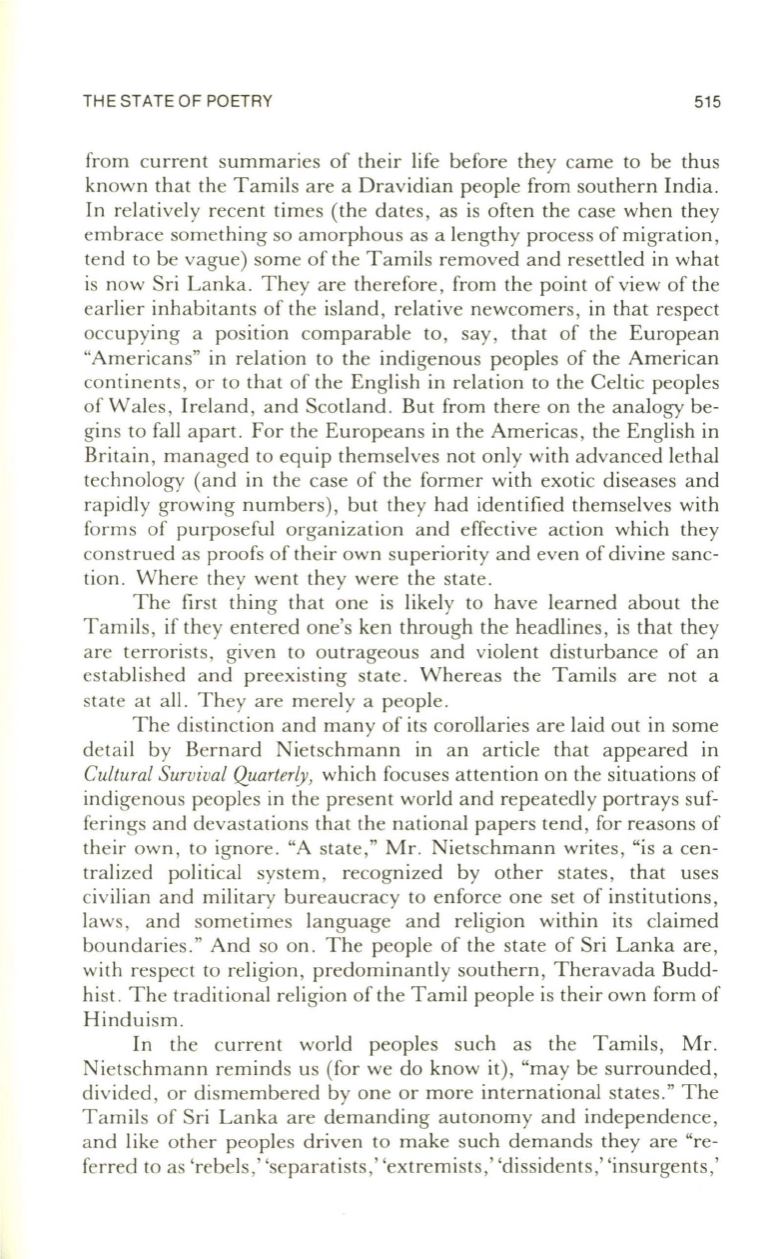
THE STATE OF POETRY
515
from current summaries of their life before they came to be thus
known that the Tamils are a Dravidian people from southern India.
In
relatively recent times (the dates, as is often the case when they
embrace something so amorphous as a lengthy process of migration,
tend to be vague) some of the Tamils removed and resettled in what
is now Sri Lanka. They are therefore, from the point of view of the
earlier inhabitants of the island, relative newcomers, in that respect
occupying a position comparable to, say , that of the European
"Americans" in relation to the indigenous peoples of the American
continents, or to that of the English in relation to the Celtic peoples
of Wales , Ireland, and Scotland. But from there on the
analogy
be–
gins to fall apart. For the Europeans in the Americas, the English in
Britain, managed
to
equip themselves not only with advanced lethal
technology (and in the case of the former with exotic diseases and
rapidly growing numbers), but they had identified themselves with
forms of purposeful organization and effective action which they
construed as proofs of their own superiority and even of divine sanc–
tion. Where they went they were the state.
The first thing that one is likely to have learned about the
Tamils, if they entered one's ken through the headlines, is that they
are terrorists, given to outrageous and violent disturbance of an
established and preexisting state . Whereas the Tamils are not a
state at all. They are merely a people .
The distinction and many of its corollaries are laid out in some
detail by Bernard Nietschmann in an article that appeared in
Cultural Survival Quarterly,
which focuses attention on the situations of
indigenous peoples in the present world and repeatedly portrays suf–
ferings and devastations that the national papers tend, for reasons of
their own, to ignore. "A state," Mr. Nietschmann writes, "is a cen–
tralized political system, recognized by other states, that uses
civilian and military bureaucracy to enforce one set of institutions,
laws , and sometimes language and religion within its claimed
boundaries." And so on . The people of the state of Sri Lanka are,
with respect to religion, predominantly southern, Theravada Budd–
hist. The traditional religion of the Tamil people is their own form of
Hinduism.
In
the current world peoples such as the Tamils, Mr.
Nietschmann reminds us (for we do know it), "may be surrounded,
divided , or dismembered by one or more international states." The
Tamils of Sri Lanka are demanding autonomy and independence,
and like other peoples driven to make such demands they are "re–
ferred to as 'rebels ,' 'separatists,' 'extremists,' 'dissidents,' 'insurgents,'


